Woman's Reaction To Sister's Suggestion To Euthanize Her Dog Causes Conflict
Life is all about the relationships we have, and sometimes, the ones with our pets are just as deep and full of feelings as those with our family. Here's a story about an 18-year-old girl facing a tough choice, highlighting the ups and downs of having a pet, getting along with family, and the significant responsibility of looking after an animal.
OP (18F) has a sister (20F) who gave her a dog two years ago because it was sick, and she didn't want to care for a 'sick mutt.' Additionally, she always yelled at and ignored the dog when she had her.
Last week, OP took the dog to the vet, who confirmed that she was in perfect health. Upon returning home, OP found her sister at the house.
The sister's first words were, 'Are we putting down the stupid dog yet?' accompanied by a big grin. This infuriated OP, who then yelled at her sister, calling her a horrible person for suggesting such a thing with a huge smile.
The sister called OP a jerk and left in tears. Their mother later told OP that she could have handled the situation better.
Although OP feels remorse for yelling, Tia (the dog's name) remains the sweetest dog in the world, still eagerly greeting the sister with a wagging tail whenever she visits. It's worth noting that they had dogs as kids, and the sister never acted this way towards them.
So, is OP the jerk in this situation?
Two years ago, OP's older sister gave her a sick dog as she didn't want to take care of it.

Last week, the vet confirmed the dog's good health, and OP's sister sarcastically suggested putting it down, angering OP.

Understanding Defensive Behavior
Dr. Emily Thompson, a clinical psychologist from Harvard Medical School, highlights that the sister's flippant remark about euthanizing the dog may reflect a defense mechanism.
According to her research, individuals often use humor or sarcasm to mask discomfort or anxiety regarding a sensitive topic.
This behavior can serve as a coping strategy, allowing individuals to distance themselves from the emotional weight of a situation while avoiding direct confrontation.
After being called a jerk, she left in tears, and OP's mom advised her to handle the situation better.

OP gave her what she deserved.

Research published in the Journal of Personality and Social Psychology shows that decisions regarding pets often evoke strong emotional responses tied to attachment.
Pet ownership is linked to increased levels of empathy and responsibility, which can escalate conflicts when differing opinions arise within families.
In this case, the sister's comments might indicate a lack of understanding of the emotional bond the dog owner shares with her pet, thus exacerbating tensions.
OP needs to be cautious to prevent any harm to Tia when her sister is present.
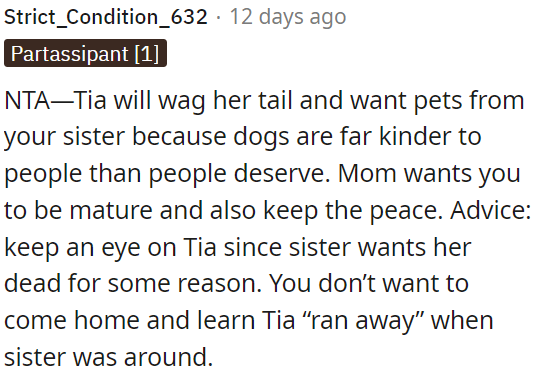
OP's reaction was justified because she was clearly trying to provoke her.

Navigating Family Conflict
Conflict resolution strategies can be essential in situations like these. Experts recommend open communication as a first step.
Encouraging each family member to express their feelings without judgment can foster understanding and reduce hostility.
Additionally, family therapy can provide a safe space for discussing underlying issues, particularly if this conflict is indicative of broader relational patterns.
OP is being a great dog mom and caring for her.
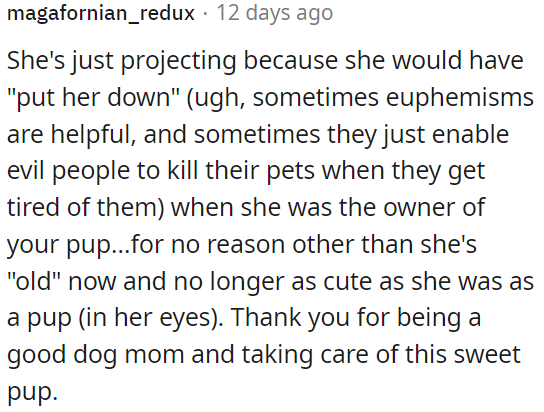
OP's sister's behavior is unacceptable.

When faced with such conflicts, it's crucial to consider the emotional stakes involved. According to trauma-informed care principles, recognizing and validating each person's feelings can de-escalate tensions.
Studies suggest that when individuals feel heard, they are more likely to engage constructively rather than defensively.
Practicing empathy, even in heated moments, can bridge gaps in understanding and facilitate healthier discussions.
OP's sister's provocation seems calculated to get OP in trouble, not about caring for the dog.
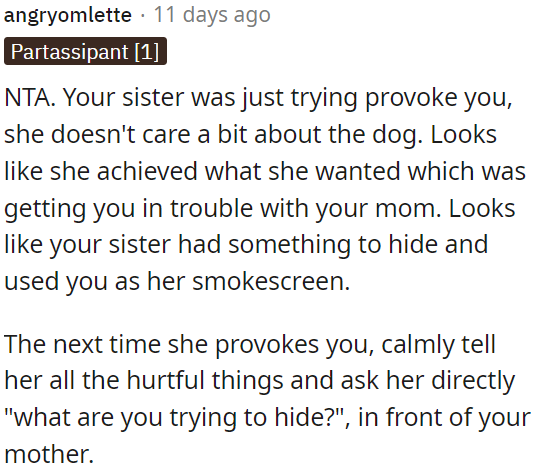
Abusing vulnerable beings is contemptible.
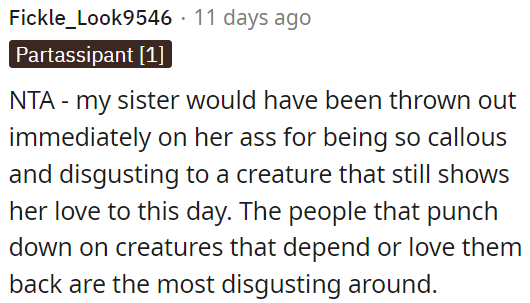
OP was right to get upset when her sister acted mean towards her dog. OP needs to be careful around her sister to keep the dog safe. Her sister's behavior is unacceptable, and it seems like she was trying to cause trouble, not help the dog.
Sadly, it's concerning that anyone would even think about hurting a pet. OP is doing a great job taking care of the dog and standing up for her. Her sister needs to realize how important it is to be kind to animals and not just give up on them when they're sick.
It's concerning that someone would find joy in euthanizing a pet.
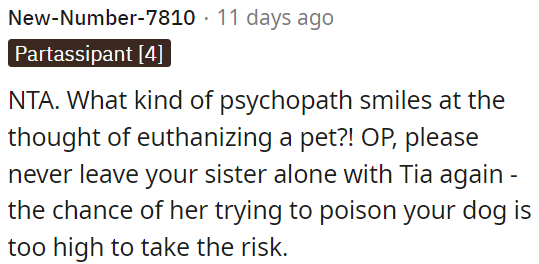
OP's sister's behavior towards the animal is unacceptable.
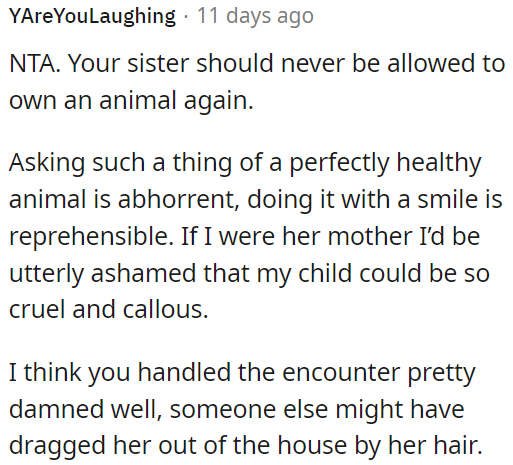
OP's sister needs a reality check; she was quick to give up on the sick dog and consider having it euthanized.
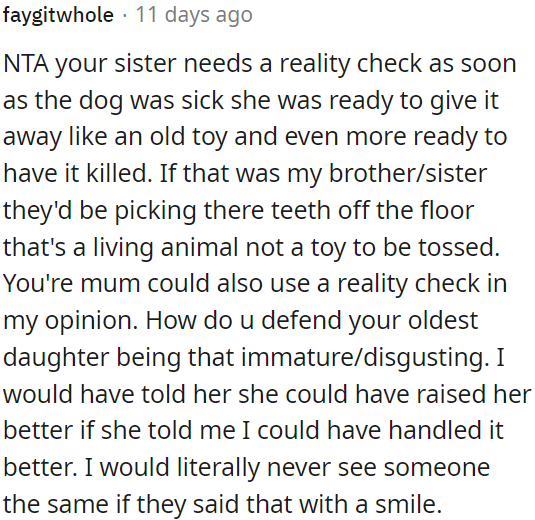
Psychological Analysis
This situation illustrates a common defensive behavior where humor is used to mask deeper anxieties about loss and responsibility.
It's vital to recognize that such comments often reveal more about the speaker's discomfort than about the issue at hand.
Analysis generated by AI
Analysis & Alternative Approaches
In summary, understanding the underlying psychological factors at play in familial disputes can promote healthier interactions.
Research supports the notion that empathy and open communication are key to resolving conflicts effectively, transforming potentially damaging encounters into opportunities for growth.



